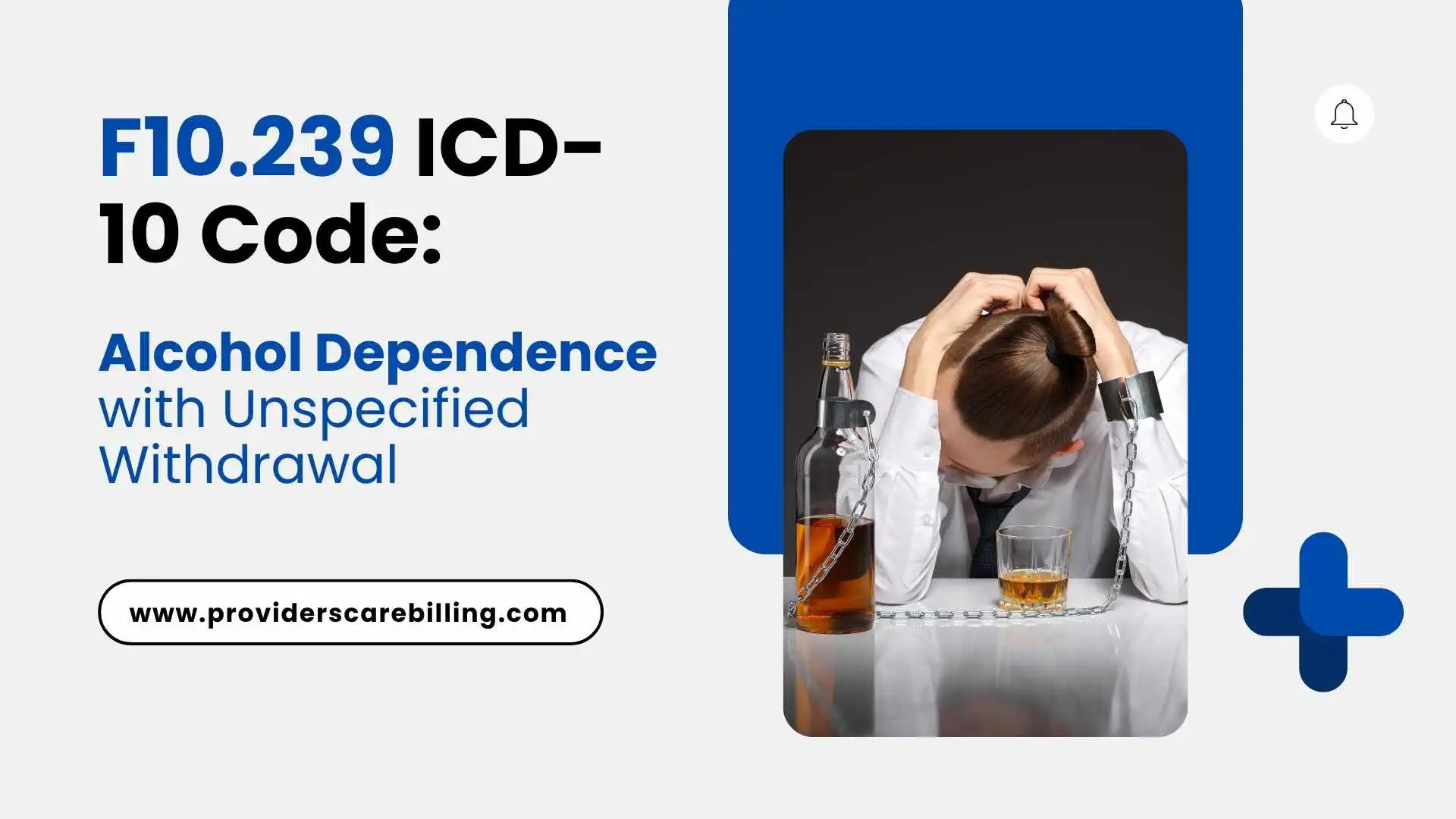Using appropriate diagnosis codes is highly important when it comes to medical billing and documentation. F10.239 is one of the codes common in behavioural health and emergency care. This ICD-10-CM code identifies alcohol withdrawal without complications.
This code is significant in hospitals, detoxification, and rehabilitation centres. It assists medical workers and insurance executives when they realise what the patient is dealing with. Therefore, we are going to explore it and learn all that is necessary about ICD-10-CM Code F10.239 simply and straightforwardly.
What Does F10.239 Actually Mean?
The code F10.239 belongs to the group of codes that address alcohol-related conditions. In the ICD-10-CM system, mental and behavioural disorders due to alcohol use are dealt with in a section labelled F10. Every decimal digit gives additional information about the condition.
The “.239” portion points to alcohol dependence with withdrawal, but without any complications. In medical terms, this is also known as acute alcohol withdrawal without further medical issues.
So in this case, the patient has intense symptoms of withdrawal due to cessation of alcohol use and does not have signs of other severe disorders such as seizures and hallucinations.
Why is This Code Important?
It is possible to have numerous instances when a person should be diagnosed with this code, such as:
- A client presents in a clinic, trembling, nervous, or perspiring after quitting alcohol.
- A person who is entering rehab is experiencing the withdrawal effect.
- An individual who is presented in the emergency room of a hospital is not showing drastic withdrawal effects but needs attention.
F10.239 will appropriately capture the patient’s condition. It is also helpful in establishing the proper alcohol detoxification, ICD-10 records of further treatment.
When Do Doctors Use F10.239?
Doctors use F10.239 when a patient is alcohol dependent and is showing withdrawal symptoms, but no complications are found. The typical alcohol withdrawal symptoms are as follows;
- Nervousness
- Trembling
- Not sleeping properly
- Nausea or sweating
- Mood changes
When such symptoms come without a seizure, hallucination, or confusion, it is perfect to employ F10.239 as an accurate code. But when the patient’s symptoms are more severe, a different code is selected.
For patients presenting with complex symptoms related to substance use disorders, such as alcohol withdrawal, accurate coding is key—especially during high-level assessments like those billed under CPT Code 99205.
Related ICD-10 Codes You Should Know
Sometimes, alcohol withdrawal comes with other issues. In those cases, different ICD-10 codes are used. Here are a few to keep in mind:
- F10.231 – Alcohol dependence with withdrawal delirium
- F10.232 – Alcohol dependence with withdrawal seizure
- F10.230 – Alcohol dependence with unspecified withdrawal symptoms
- F10.10 – Alcohol abuse without dependence
So if somebody says the ICD 10 code for alcohol withdrawal seizure, they are definitely talking about F10.232.
The Role of Detox and Care Plans
An alcohol detoxification plan under medical supervision may be necessary in most cases where the patients have alcohol abuse with withdrawal ICD-10. This is especially true when they have spent long periods abusing alcohol. During detox, doctors monitor the patient to avoid issues such as:
- Seizures
- High blood pressure
- Hallucinations
When the person has no complications but only withdrawal symptoms, F10.239 is a proper diagnosis. It can still determine whether the individual is eligible for care and guide their course of care.
Using the Right Language in Medical Billing
Healthcare providers need the right code when they develop a treatment report or a billing document. If they select the incorrect one, they may slow down payments or become entangled in insurance coverage. For example:
- Using F10.239 tells the insurer the patient is going through withdrawal without extra risks.
- Application of F10.232 will inform them that the patient has experienced a seizure and requires a different level of care.
This is why billing teams need to understand terms like:
- ETOH withdrawal ICD 10 – This is a short way of ethanol withdrawal (alcohol) withdrawal, and alcohol withdrawal all speak of the same thing.
- ICD 10 code for alcohol abuse with withdrawal – This characteristic typically refers to F10.239, with the exception of having complications.
- Code 239 – Sometimes, people refer to F10.239 in short form, especially in internal notes or charting systems.
How Does F10.239 Help in Long-Term Care?
Don’t consider detox the end of this journey. Many patients adopt a complete procedure, including counselling, medication, and long-term recovery plans. When F10.239 is on their chart, it serves as a record that they experienced withdrawal at one point, but without complications. This helps:
- Counsellors adjust therapy plans.
- Doctors monitor for relapse.
- Treatment centres prepare follow-up care.
Sometimes, patients may be switched from an alcohol abuse diagnosis to alcohol dependence ICD codes. This usually happens if they meet more long-term signs of addiction.
The Human Side of Alcohol Withdrawal
No doubt, codes like F10.239 look so technical, but they show very real struggles. People feel that alcohol withdrawal is scary, even without major health issues. Many people going through it feel:
- Nervous and alone
- Conscious of their condition
- Being judged every time by everyone
This is why early support and the right treatment are extremely important.
Common Mistakes in Diagnosis Coding
Even experienced medical staff sometimes mix up the codes. Some of the common mistakes include:
- Using F10.239 for patients with seizures – This should be F10.232 instead.
- Mixing up alcohol abuse with dependence – Abuse and dependence are not the same.
- Not including enough detail in the notes – A short description can lead to incorrect coding.
So, if a patient is facing alcohol abuse with withdrawal, ICD-10, it is essential to note whether it is abuse or dependence. And above all, whether complications are present or not.
Final Thoughts!
The ICD-10-CM Code F10.239 looks like digits, but it is a valuable element in the development of alcohol treatment and recovery. It is applied in alcohol-dependent patients in the withdrawal stage, however, with non-serious medical conditions such as seizures or confusion.
As much as it can be included in the list of ETOH withdrawal ICD 10, alcohol detoxification ICD 10, and acute alcohol withdrawal ICD 10, the code promotes proper treatment plans and transparent insurance reports. It also aids in the monitoring of the progress of a patient in getting out of ill health. Above all, it is a reminder that behind any code, there is a person aiming to improve, and anyone can certainly do it with their help.
Need Help With Medical Coding or Alcohol Withdrawal Cases?
The interpretation of such codes as F10.239 may be difficult. Whether you do healthcare provision or medical billing, or are also merely a patient trying to find meaning in medical records, do not feel shy to get the opinion of experts.
Contact the skilled practitioners of Providers Care Billing now and ensure that your claims are proper and your patients are provided with the care they require with no delays.
To obtain the correct ICD-10 codes in your practice, contact our team today!





